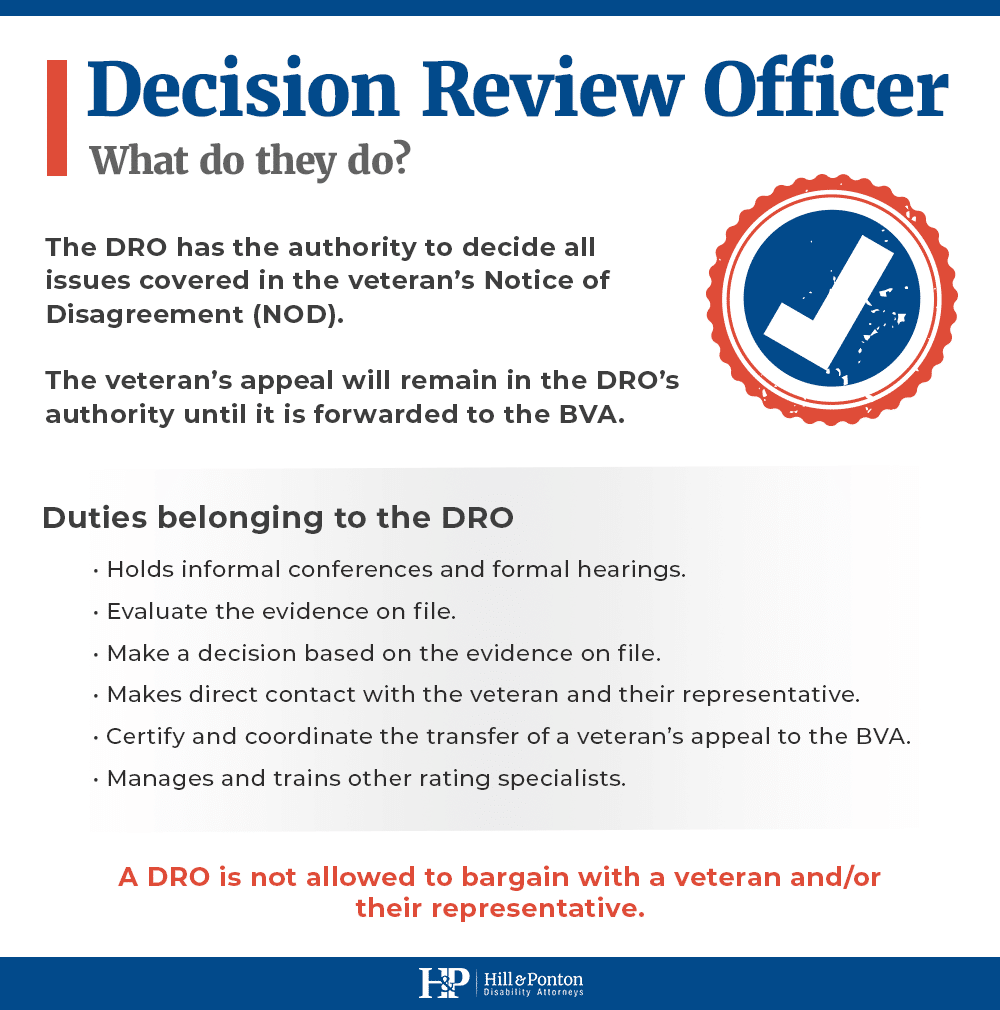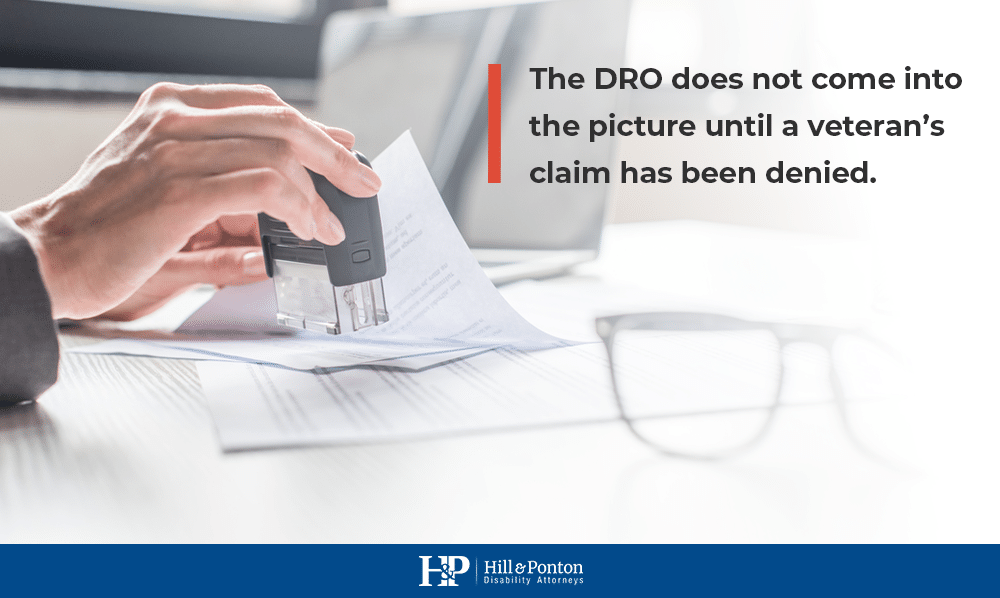In 2019, the Appeals Modernization Act was put into action. However, the Department of Veterans Affairs is still dealing with a significant backlog of older claims that they call “legacy claims”. In this post, we’ll go over what that legacy appeals process looks like and one key component being the DRO.The Decision Review Officer (DRO) is a member of the appeals team at the VA Regional Office (RO). The DRO process provides a veteran with a great tool to have a higher-up VA official at the department of veterans affairs review their case, and possibly even overturn a prior denial.
Another good aspect of the DRO process is that it allows a veteran an opportunity to get their claim and disability benefits granted in a quicker fashion than having to wait for the Board of Veterans Appeals (BVA) to make a decision. In order for the DRO process to begin, a veteran has to specifically choose to have their appeal or rating decision reviewed by a DRO.
Requesting DRO Review
The DRO does not come into the picture until a veteran’s claim has been denied. VA regulations provide that a veteran has a limited period of time to select the VA DRO review process and receive the DRO hearing. The first time a veteran can request DRO review is with the filing of their NOD for re-decision on the veteran’s disability benefits. If the DRO process isn’t selected at the time the NOD is filed, the RO will notify the veteran of the va decision and the veteran’s right to have their appeal decided by a DRO.
The veteran then has 60 days from the date on the notice to select the DRO review process. If the DRO process is not selected within the 60 day time period, the veteran’s appeal will be decided by the traditional appeal process and the RO will issue a Statement of the Case (SOC).

How Long Does a VA DRO Decision Take?
When requesting a DRO review, some veterans may want to know how long a VA DRO decision takes. However, the answer isn’t necessarily straightforward. The length that the DRO decision will take depends on the evidence of record that is available, as well as whether the VA has a claims backlog.
Authority & Duties of the DRO (Decision Review Officer)
The DRO has the authority to decide all issues covered in the veteran’s Notice of Disagreement (NOD). The veteran’s appeal will remain in the DRO’s authority until it is forwarded to the BVA. When the DRO is deciding issues on appeal, they perform what’s called de novo review. De novo review means the DRO will conduct a completely new review of the veteran’s claim without giving any weight to the previous denial.
If the DRO doesn’t have to give any weight to the prior denial, does that mean the DRO can overturn a favorable part of that decision?
No, the DRO is not allowed to reverse a favorable part of the prior decision. The only exception is if the favorable part contains clear and unmistakable error (CUE), which involves a very high burden on the part of the DRO.
The VA lists the following as duties belonging to the DRO:
- Holds informal conferences and formal hearings
- Evaluate the evidence on file. This includes evaluating whether additional evidence is needed.
- Make a decision based on the evidence on file.
- Will make direct contact with the veteran and their representative.
- Certify and coordinate the transfer of a veteran’s appeal to the BVA.
- Has a supervisory role in the management and training of rating specialists.
What can a DRO NOT do?
VA regulations instruct that a DRO is not allowed to bargain with a veteran and/or their representative over their disability claims or disability rating. This means that a DRO cannot ask a veteran to do anything (such as withdraw a claim) in exchange for the granting of another benefit. The DRO can talk to a veteran or their representative about the DRO’s opinion as to the merit of the veteran’s claim, but they cannot require the veteran to take any kind of action in order to get a favorable result.

Hearings Conducted by a DRO (Decision Review Officer)
Selecting the DRO process ultimately results in a hearing (and possibly a new decision) where the DRO looks at all of the evidence of the record and makes their determination on the veteran’s claim. The hearing is typically held at the RO that issued the prior decision. If the RO that issued the prior decision is far away from where the veteran lives, it may be able to request the hearing to be held via video conference.
An alternative to a formal hearing (which can mean a longer wait-time for a decision to be issued), is having an informal conference with the DRO. A formal hearing and an informal conference both result in the DRO deciding whether the veteran’s claim should be granted or denied.
Disclaimer: If the decision of the DRO is unfavorable, the veteran does not have to file another NOD. Instead, the veteran’s appeal continues and an SOC will be issued. After the SOC is issued, the veteran must file a VA Form 9 within the specified time period to continue their appeal. By filing the VA Form 9, the appeal will be transferred to the BVA for a decision on the issues.
The DRO is allowed to look at any new and material evidence that has been received since the prior decision, and can oftentimes lead to the DRO changing the previous decision. Because of the impact new and material evidence can have, especially evidence of a service connection, it is very important to present evidence at the RO level. If the DRO does not overturn the prior denial, they will issue a SOC. At that point, the veteran would need to file a VA Form 9 to continue their appeal to the BVA.




